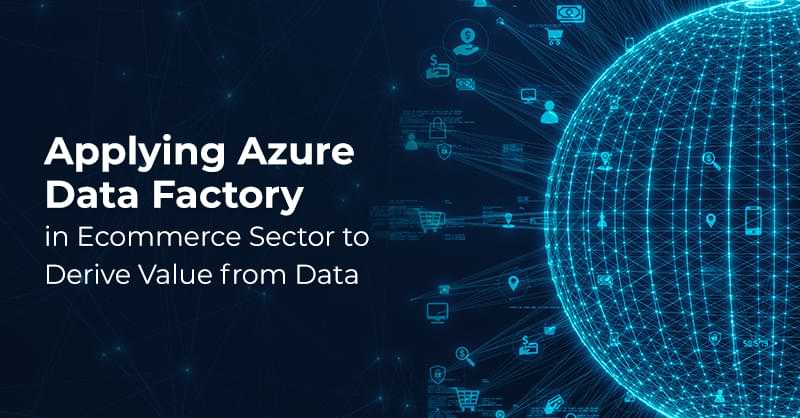Applying Azure Data Factory in Ecommerce Sector to Derive Value from Data

Written by Hafsa Mustafa
Technical Content Writer
October 31, 2022
There is no denying that making personalized recommendations for prospective customers, performing accurate customer profiling, and keeping a correct count of transactions is usually of paramount importance for ecommerce businesses that thrive on online selling. However, in order to stay at the top of things, they need data to stay informed and strategize wisely in the future.
This blog will discuss how Azure Data Factory can be put to use in the ecommerce sector to help online businesses extract maximum value out of their data assets.
Scenario In Question
The post-pandemic world is undoubtedly seeing a major tilt toward online shopping. According to research, almost 75% of consumers tend to shop online at least once a month. This calls for the need to improve the overall experience of the customers to ultimately increase the sales revenue. Ecommerce firms are increasingly looking for ways to perform transformations at scale while migrating the data and also to automate the whole process of data movement.
Challenges Facing Online Retail Sector
While the idea of utilizing available data to generate insights seems doable, it is more than often not easy as businesses receive and produce data in multiple forms and at multiple locations. The challenge ahead lies in collecting data from different cloud data stores and on-premises systems and pouring it into a uniform system to make it available for producing predictive and descriptive analytics.
The data can be related to historical customer behavior, customer feedback, conversions made, the real-time actions of customers and their basic information, product descriptions, and segmentation data. This data may be lying in an Azure SQL database, an on-premises server, or a remote warehouse. The disparate presence of data across numerous storage sites makes it difficult for decision-makers to make sense of it.
Retailers need a swift data delivery system not only to make instant recommendation generation possible customer browses through the catalogs but also to materialize data-driven decision-making for different departments. The overall goal is to increase the return on investment (ROI) and make the whole purchasing experience as seamless and informed as possible for the consumer.
Solution
To answer these challenges, we will leverage the power of Azure Data Factory to carry out data integration and movement between different data stores by creating and scheduling pipelines.
Azure Data Factory is a cloud-based data integration and ETL service that automates the process of combining and moving data across multiple platforms through orchestrating data pipelines. By orchestrating data migration, Azure Data Factory creates efficient data flows for businesses.
With the help of Azure Data Factory, we will enable eCommerce retailers to ensure data consistency by overcoming compatibility issues and carrying out immediate data transformation to allow the data to move into a centralized repository.
Transformation on Ecommerce Data
The concerned business can extract multiple advantages from the solution. It can not only ingest data from a diverse pool but can also transform data to combine it on any unified platform to provide a single source of truth to personnel belonging to different departments like data science, marketing, sales, supply chain, Business Intelligence, and higher management. Now, enterprise data can easily be integrated and scheduled for migration, upon which ADF sets off runs automatically to get the job done. Some of the major benefits of the ADF solution have been mentioned in the image below.
Benefits of Using ADF
Business Benefits
With data integration services, Azure Data Factory can benefit businesses in that the respective data science teams can use the data to build predictive analytics. The insights can be about how to personalize the products and advertisements in a better way, which areas and age groups to specifically target, and how to design the perfect pricing strategies. The business insights can ultimately translate into better sales forecasting, increased ROI, innovative pricing strategies for every product, and personalized product recommendations.
Business Benefits of ADF

Conclusion
This blog discusses how Azure Data Factory can be successfully employed to help online retailers in gaining a competitive edge in the market and integrate their data effortlessly as they like. Royal Cyber data experts are skilled at devising tailor-made, intelligent solutions for different industries by employing modern data technology. Feel free to contact us should you have any queries.
Recent Blogs
- An Insight into ServiceNow Hardware Asset Management (HAM) Ramya Priya Balasubramanian Practice Head Service Now …Read More »
- Learn to write effective test cases. Master best practices, templates, and tips to enhance software …Read More »
- In today’s fast-paced digital landscape, seamless data integration is crucial for businessRead More »





